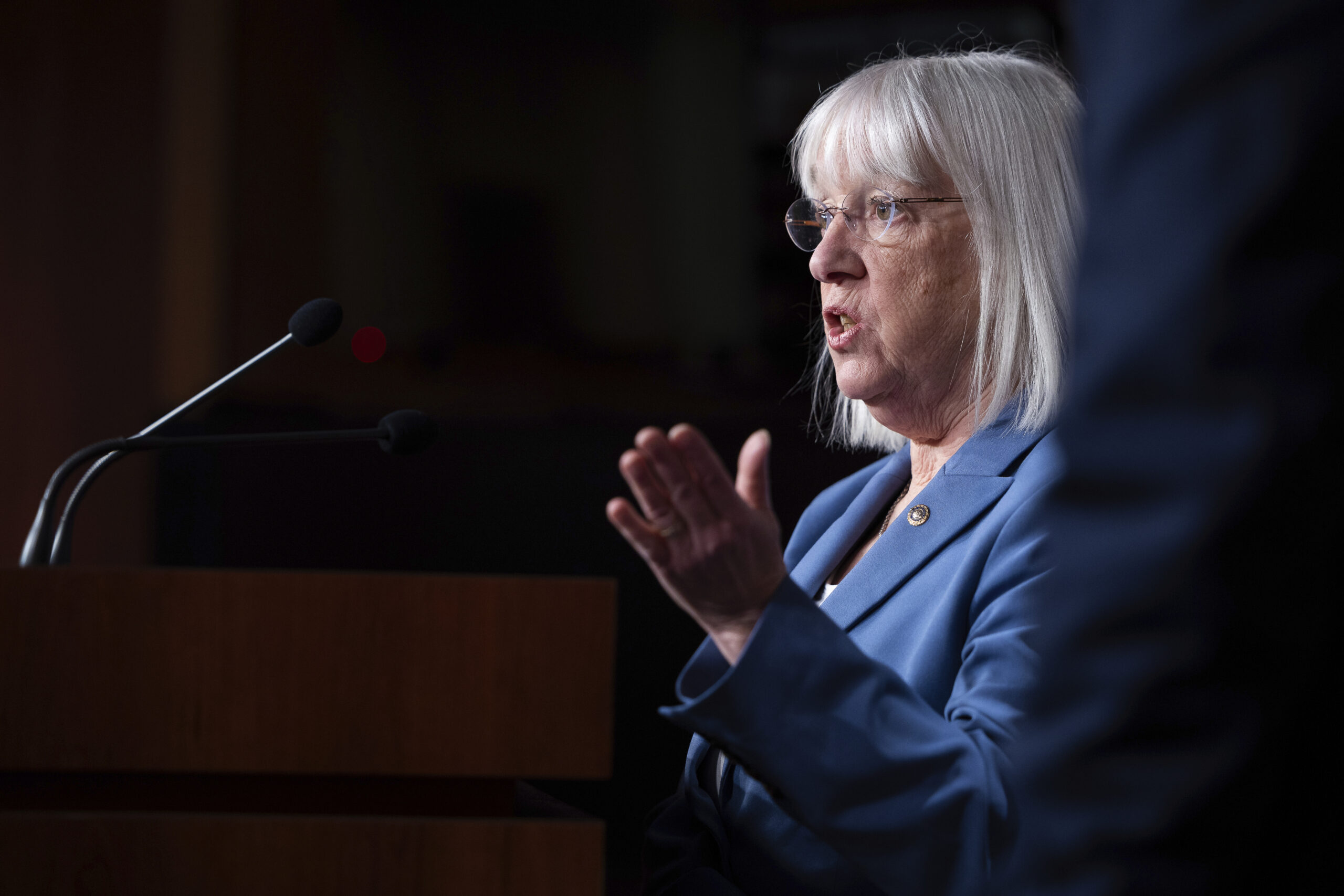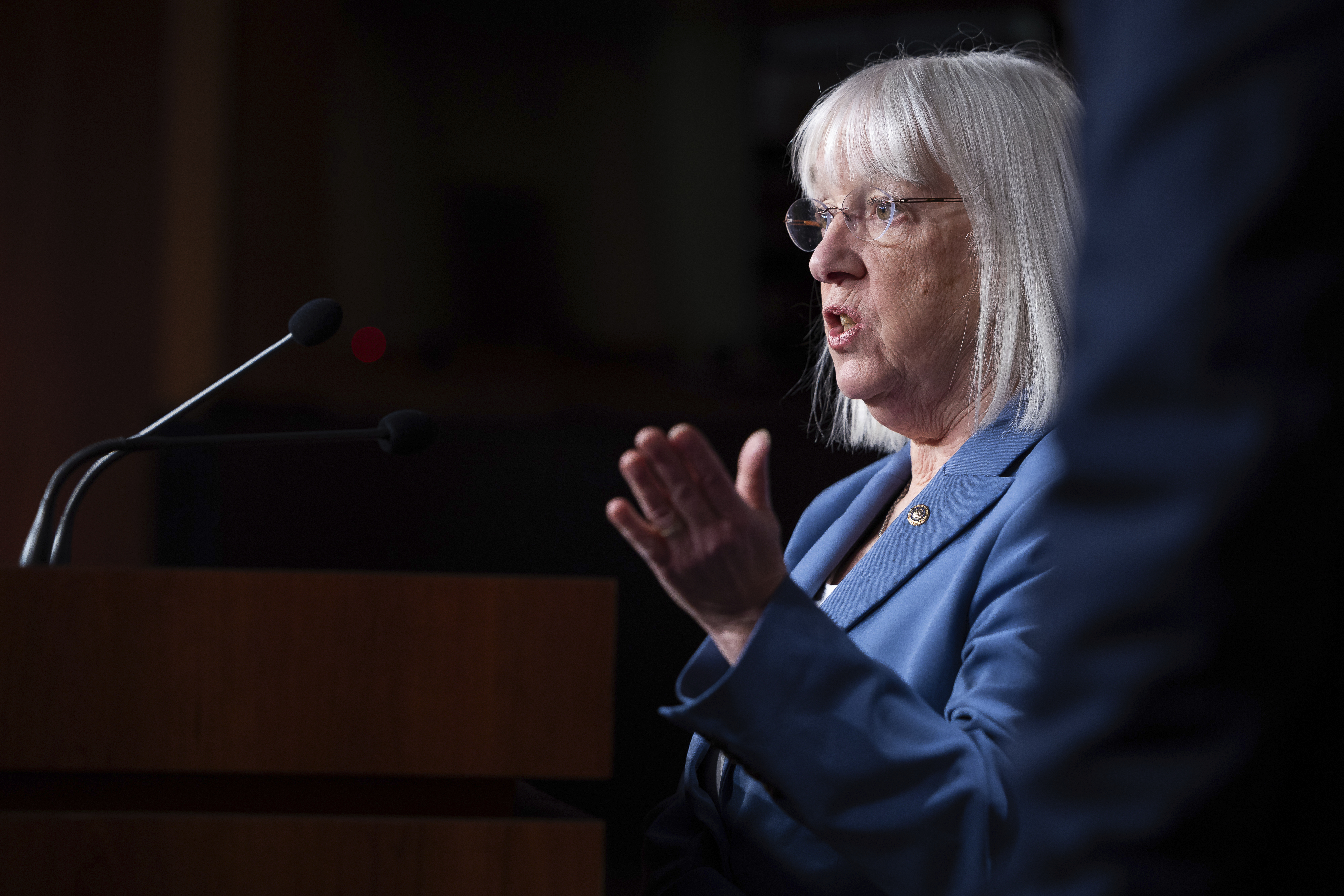Congress
Sen. Todd Young will back Tulsi Gabbard as director of national intelligence
Sen. Todd Young said Tuesday he will support Donald Trump’s embattled nominee for director of national intelligence, Tulsi Gabbard, improving her chances of confirmation.
Facing a wave of political pressure from Trump allies to back Gabbard, Young “engaged in extensive conversations” with Vice President JD Vance in which he sought written assurances about Gabbard’s perspective on whistleblowers, according to a person familiar with his deliberations who was granted anonymity to describe them.
“American intelligence officers around the globe deserve our respect and support. I appreciate Tulsi Gabbard’s engagement with me on a variety of issues to ensure that our intelligence professionals will be supported and policymakers will receive unbiased information under her leadership,” Young said in a statement to Blue Light News.
“I have done what the Framers envisioned for senators to do: use the consultative process to seek firm commitments, in this case commitments that will advance our national security, which is my top priority as a former Marine Corps intelligence officer,” he added. “Having now secured these commitments, I will support Tulsi’s nomination and look forward to working with her to protect our national security.”
Young made his statement just hours before he is set to vote on Gabbard’s nomination inside the Intelligence Committee, where any Republican opposition could help scuttle her nomination.
The person familiar with Young’s deliberations said he also made clear he opposes granting any pardon to NSA leaker Edward Snowden — who was a major focus of Gabbard’s Senate Intelligence Committee hearing last week.
A hawkish internationalist in the mold of his former mentor the late Sen. Richard Lugar, Young sharply questioned Gabbard there over her past support of Snowden.
“I think it would befit you, and be helpful to the way you are perceived by members of the intelligence community,” Young told Gabbard during a hearing last week, “if you would at least acknowledge the greatest whistleblower in American history, so-called, harmed national security by breaking the laws of the land.”
Young did not back Trump’s 2024 presidential bid and has called his judgment about dealing with Russian President Vladimir Putin into question.
The Hoosier senator has found himself the target of heavy pressure from MAGA Republicans in recent days, including from Elon Musk, who called him a “deep state puppet” in a post on X before deleting it, saying later he stood “corrected.”
After Musk and Young spoke Sunday, Young’s office told Blue Light News the billionaire Trump adviser did not press him on Gabbard during the call.
With statements from Young today and Sen. Susan Collins of Maine yesterday, Sen. Jerry Moran of Kansas is the only Senate Intelligence Committee Republican who has yet to disclose how he will vote on Gabbard.
Congress
New Democratic bill targets Elon Musk
A veteran House Democrat is introducing new legislation to respond to billionaire Trump ally Elon Musk’s overhaul of the federal government: Rep. Mark Pocan (D-Wis.) on Wednesday rolled out the Eliminate Looting of Our Nation by Mitigating Unethical State Kleptocracy (ELON MUSK) Act, which would ban “special” government employees like Musk from having federal contract.
“No government employee, ‘Special’ or not, should have any financial interest in who the government does business with,” Pocan said. “Elon Musk is the poster child for this type of potential abuse. After more than $20 billion in federal contracts, there’s no way Musk can be objective in what he’s doing.” Musk holds major federal contracts through his companies including SpaceX and Starlink.
It’s the latest example of Hill Democrats turning Musk into an target of their opposition in President Donald Trump’s administration.
Musk’s so-called Department of Government Efficiency effort prompted top House and Senate Democrats to also introduce a bill Tuesday to block “unlawful access” to the Treasury Department payment system that Musk and his allies recently gained access to. That bill is also likely to go nowhere in the GOP-controlled Congress.
Congress
Capitol agenda: Shutdown anxieties, reconciliation problems, Vought all-nighter
Senate Republicans are gearing up to ask Trump in a dinner Friday whether they should take the lead on advancing the core of his sweeping legislative agenda, as House efforts to kick off budget reconciliation look like they’ll collapse.
Majority Leader John Thune told Mia on Tuesday night that GOP senators’ two-bill strategy “could be in play” for Trump.
House Majority Leader Steve Scalise emerged from a private reconciliation meeting late Tuesday and said that GOP leaders were haggling over at least $1 trillion in guaranteed spending cuts, but had no agreement even as they work toward a Budget Committee vote next week. GOP leaders are facing delays as conservative hard-liners push for steeper cuts as part of enacting Trump’s priorities on energy, the border and taxes.
Lawmakers are also growing anxious about the government shutdown deadline on March 14. Top appropriators are struggling to reach agreement on spending levels, thanks in part to complications from Trump’s chaotic overhaul of the federal bureaucracy.
“I don’t think anybody thinks a shutdown is a good thing. But the politics are such that we could certainly stumble into one without meaning to,” House Appropriations Chair Tom Cole said in an interview.
What else we’re watching:
- Get ready for a long night: Senators are girding for an all-nighter as Democrats plan to use all 30 hours of debate over Russ Vought’s confirmation to protest the OMB director nominee. Senate Democrats plan to unanimously vote against Vought, but that won’t derail his confirmation.
- Musk’s limited Treasury access: The Treasury Department said in a Tuesday letter to Sen. Ron Wyden that Elon Musk’s team has “read-only” access to the system that controls trillions of dollars in federal payments, and that there have not been any suspensions or delays to disbursements approved by federal agencies.
- Republicans have an ax to grind: GOP senators are looking at what final Biden administration regulatory actions they can quickly ax along party lines under the Congressional Review Act. Thune said his conference has “10 or 15 potential CRAs that we’ve been reviewing and looking at.”
- IRA fight ramps up: A coalition of companies and trade associations will lobby lawmakers today to save Biden-era clean energy tax incentives that Republicans are considering clawing back in their search for spending cuts.
Jordain Carney, Meredith Lee Hill, Jennifer Scholtes and Michael Stratford contributed to this report.
Congress
Shutdown anxiety rises on Capitol Hill amid Trump chaos

The president in charge during the longest government shutdown in U.S. history has returned to the White House, current government funding expires in less than six weeks — and on Capitol Hill, people are nervous.
It’s not just President Donald Trump’s history of leading the country through a 35-day funding lapse that has lawmakers worried about his appetite for another one in March. It’s also that Trump’s actions in his first two weeks back in office are stifling bipartisan negotiations toward a funding deal as the president — and his “government efficiency” chief, Elon Musk — work to bulldoze the federal bureaucracy while freezing billions of dollars Congress already enacted and firing federal workers.
“I don’t think anybody thinks a shutdown is a good thing. But the politics are such that we could certainly stumble into one without meaning to,” House Appropriations Chair Tom Cole, an Oklahoma Republican, said in a brief interview Tuesday.
The new president’s truculent first days in office have created an especially unfavorable climate on Capitol Hill for landing any cross-party accord, whether that’s a “grand funding deal” ahead of the government shutdown deadline or an agreement to lift the debt limit to prevent the U.S. from defaulting on more than $36 trillion in loans in the coming months.
While the Democratic leader in the House demands that Trump’s funding freeze be “choked off” as part of any funding agreement, Republican lawmakers say it will be Democrats who take the fall for causing a funding lapse if they hold that line. And so the shutdown blame game begins again.
“The president issued an executive order to curb spending. I highly doubt Republicans are going to rescind that. I don’t see that happening,” Rep. Lisa McClain (R-Mich.), the chair of the House Republican Conference, said late Tuesday. “That’s on Dems if they want to shut it down.”
Behind closed doors, Cole and Congress’ other three top appropriations are trying to strike a bipartisan deal on the first step toward funding the government by the March 14 deadline: One overall spending total for the military and another for non-defense programs. From there, it usually takes at least a month to negotiate and finalize the dozen individual funding bills. The clock is ticking fast.
The exasperated Democrats sitting opposite Cole at the negotiating table say any good faith agreement with their GOP counterparts is meaningless if Trump disregards the will of Congress by using “impoundment” to withhold funding they pass into law.
“If the White House is not going to honor an agreement and use impoundment, then it is hard to come to agreement,” Washington Sen. Patty Murray, the Senate’s top Democratic appropriator, said in a brief interview Tuesday.
Democrats want Trump to unfreeze foreign aid and billions of dollars already promised to federal contractors and local governments, while also stopping Musk from dismantling agencies like the U.S. Agency for International Development. They also want Trump to promise he will sign into law — and then actually follow — whatever bipartisan funding deal they might strike in the coming weeks, especially after he and Musk goaded GOP leaders into disavowing the December spending package all parties had previously approved.
“We need assurances. That’s all I’m going to say,” Murray said.

Congress’ four funding leaders — Murray and Cole, along with Senate Appropriations Chair Susan Collins and the House’s top Democratic appropriator, Rep. Rosa DeLauro of Connecticut — all praised each other’s efforts.
“Everybody in the room of goodwill, wanted to move forward” is how DeLauro described the ongoing funding negotiations between the so-called “four corners.”
But DeLauro is also wary. “Don’t tell me that all bets are off. That we’re going to come to a deal … and then all of a sudden Elon Musk or some other self-subscribed unchecked billionaire decides it’s not to his liking. Hell no.”
Trump already learned lessons on the toll of a government shutdown in late 2018 and early 2019, when funding to parts of the federal government lapsed for five weeks while he faced off with Democrats in Congress over funding for the border wall. It was a fight Trump ended up losing.
“I actually don’t think Donald Trump — having been through it — I don’t think he found it rewarding,” Sen. Kevin Cramer said Tuesday. “So I think he’s pretty serious about getting something done.”
The North Dakota Republican also noted the other main factor at play: the current fury of lawmakers in the minority party who have the power to tank a funding bill they don’t like given the narrow GOP majorities in both chambers. In the House, especially, are a number of fiscal conservatives who never vote for funding bills, no matter what. It means any funding bill will require Democratic support to pass.
“God, I hope that doesn’t happen. I mean, I really don’t,” Cramer said of the prospects of a government shutdown in March. “The Democrats aren’t in much of a mood to help.”
If top lawmakers can’t come to an agreement to keep the government funded, or if Trump bucks that deal, the new president would have some control over what federal efforts would continue beyond the March 14 deadline.
Trying to stem some of the public impact of the partial government shutdown in 2019, his administration tapped into park entrance fees to keep national parks open, a move federal watchdogs found in violation of the law. With Musk empowered now to compel entire government offices to shed staff or shutter entirely, the stakes are higher for what a federal funding lapse could entail this time around.
The effects are also, generally speaking, more difficult to quell the longer a government shutdown lasts, as benefit payments like SNAP food assistance are eventually withheld.
“These things get worse and worse and worse the longer they go on,” said Bobby Kogan, who served during the Biden administration as adviser to the White House budget director.
Kogan, who now works for the liberal Center for American Progress, said he is “skeptical of the idea that Trump will deliberately shut us down as another way to stop spending, because shutdowns are deeply unpopular.”
But Trump’s funding freeze and unwillingness to abide by funding caps enacted two years ago under then-Speaker Kevin McCarthy and President Joe Biden create a “real risk.”
Katherine Tully-McManus contributed to this report.
-

 The Josh Fourrier Show3 months ago
The Josh Fourrier Show3 months agoDOOMSDAY: Trump won, now what?
-
Economy3 months ago
Fed moves to protect weakening job market with bold rate cut
-
Economy3 months ago
Harris dismisses Trump as ‘not serious’ on the economy in BLN interview
-
Economy3 months ago
It’s still the economy: What TV ads tell us about each campaign’s closing message
-
Politics3 months ago
Donald Trump wants Americans to hate Kamala Harris — but he’s failing
-
Economy3 months ago
Biden touts economic gains, acknowledges a long way to go
-

 Politics3 months ago
Politics3 months agoDemocrats express concern over Gaetz pick
-

 Politics3 months ago
Politics3 months agoRFK Jr.’s bid to take himself off swing state ballots may scramble mail-in voting





